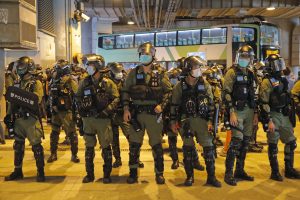On May 21, the day before the National People’s Congress (NPC) was to meet, the Chinese government suddenly announced that it would consider a draft of a national security law for Hong Kong. The announcement shocked the world.
On May 28, the NPC adopted the draft. The NPC Standing Committee, which was authorized to pass the law, held two sessions in late June. Normally, the committee holds one session every two months and it takes three sessions to enact a law. Yet this time the committee completed the process in just two sessions held in quick succession. The law was passed on June 30 and went into force the same day.
This represented astonishing speed, although it was not entirely without precedent. When it comes to the politics of Hong Kong, the government has repeatedly accelerated processes when strong objections to unpopular policies were raised. As the SARS infection spread in 2003, the Hong Kong government accelerated the Legislative Council’s deliberation of the National Security (Legislative Provisions) Bill. However, the 2003 protests drew 500,000 people, and the bill was scrapped. In 2019, the government tried to revise the Hong Kong extradition bill. The government ignored massive protests and stepped up the pace of deliberations. The bill, however, was not enacted. It only led to chaos throughout Hong Kong and invited criticism from the international community.
Last year’s crisis was triggered by issues surrounding the extradition of a murder suspect. The hard line taken by the government prompted an increasing number of Hong Kong citizens to join protests, which consequently escalated, and the extradition bill failed to pass. The pro-democracy camp won a landslide victory in the 2019 District Council elections while the United States enacted the Hong Kong Human Rights and Democracy Act of 2019. If the Hong Kong authorities had been more prudent in their attempts to amend the extradition bill, the result could have been very different. Instead, their hardline policy triggered strong opposition, and the government found itself fighting on a rapidly expanding front.
The Hong Kong national security law “safeguards national security,” and enables the extradition of suspected criminals to mainland China. The Chinese government tried to quickly bounce back from the setbacks in 2003 and 2019. Now, finally, its tactics of accelerating deliberations and forcing its will through the legislative process appear to have been successful. But is it really possible for the Chinese government to solve every political issue in this way, as it appears determined to do?
Certainly, the Hong Kong national security law had an immediate chilling effect. Until the law took effect at 11 p.m. Hong Kong time on June 30, no text of the law had been disclosed. No crimes or punishments had been disclosed. In this environment, many political organizations, including Demosistō, which was established by Joshua Wong and others, disbanded. Nathan Law, a former member of the Legislative Council fled from Hong Kong. On July 1, the day after the law was enforced, ten people were arrested on suspicion of violating it. The reasons for the arrests included the holding of a flag that said “Hong Kong Independence.” The government issued a statement that said the slogan “Liberate Hong Kong, the revolution of our times” violates the Hong Kong national security law. Police visited restaurants and stores supporting pro-democracy groups and ordered them to remove slogans criticizing the government from their establishments. Overnight, Hong Kong changed dramatically.
Resistance in Hong Kong, however, has not ended. When certain words are prohibited, people choose other words and continue to protest. Now in Hong Kong, no words are necessary. A slogan consisting of eight characters has changed into a string of eight symbols, such as a quadrilateral, triangle, and circle, which are extremely simplified Chinese characters. To people unaware of their background, they are just symbols, but the people of Hong Kong know what they mean. The lyrics of prohibited songs have changed to a string of digits. Those who understand Cantonese understand the meaning of those digits. The government will need to make laws that prohibit symbols and digits. Even if that were to happen, the protests will be unlikely to cease. Some are taking to the streets, holding eight blank sheets of paper, and some are sticking blank sticky notes to walls.
Moreover, there is concern about the radicalization of resistance. Pro-independence forces in Hong Kong says they will continue to conduct prohibited activities, taking them underground. On July 1, a police officer was stabbed. Someone rode a motorbike into a group of law enforcement officers. It will be tougher to clamp down on groups hiding underground than to clamp down on political groups that act publicly.
The enactment of the national security law has meanwhile triggered unprecedented criticism from European countries, the United States and Japan. The United States has already imposed sanctions and enacted the strong Hong Kong Autonomy Act. The battle lines now stretch across the world.
The political problems of Hong Kong, long considered a peaceful economic city, have been exacerbated by the actions of the government, which have been limited to hardline measures. Actions meant to safeguard national security have in fact produced a rapid worsening of the national security crisis. Indeed, mainland China itself may face its own crisis that has its roots in Hong Kong.
Having come this far, the Chinese government is unlikely to make concessions. The crisis will likely continue to expand from its Hong Kong origins and East Asian countries would do well to ready themselves for the emerging New Cold War.
Kurata Toru is a professor at the Rikkyo University College of Law and Politics.

































